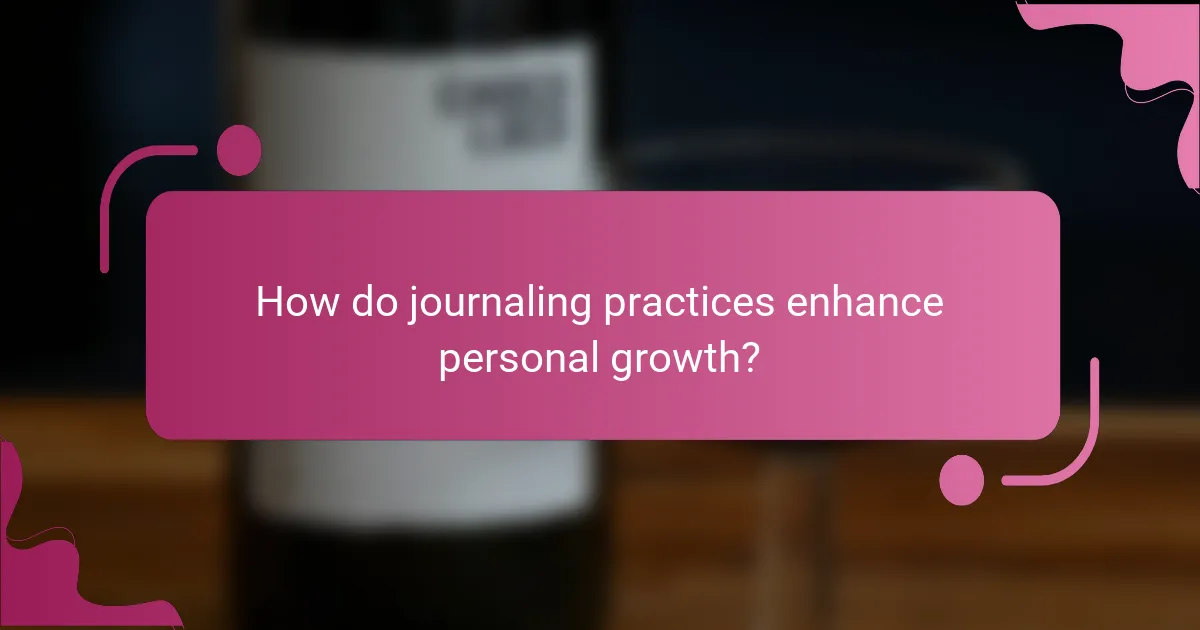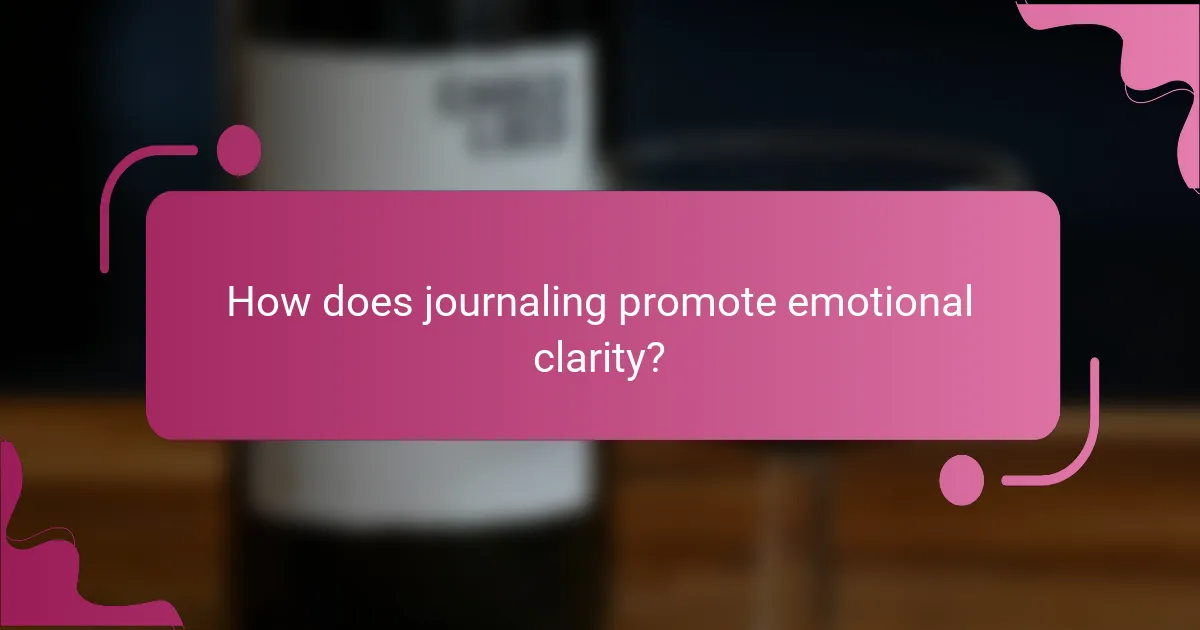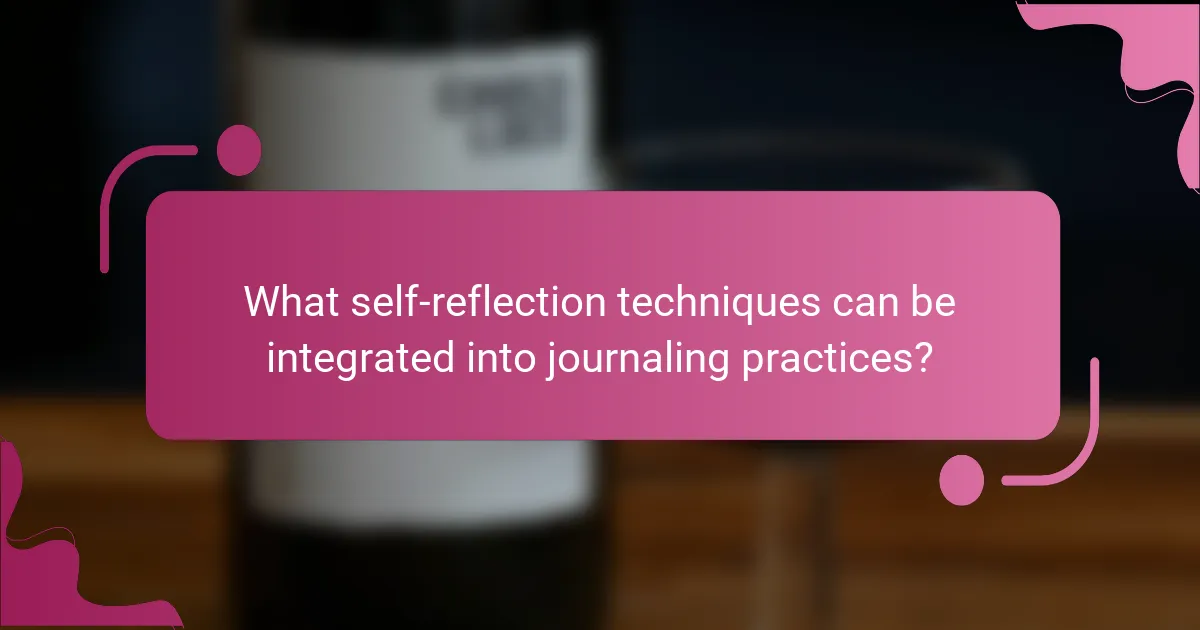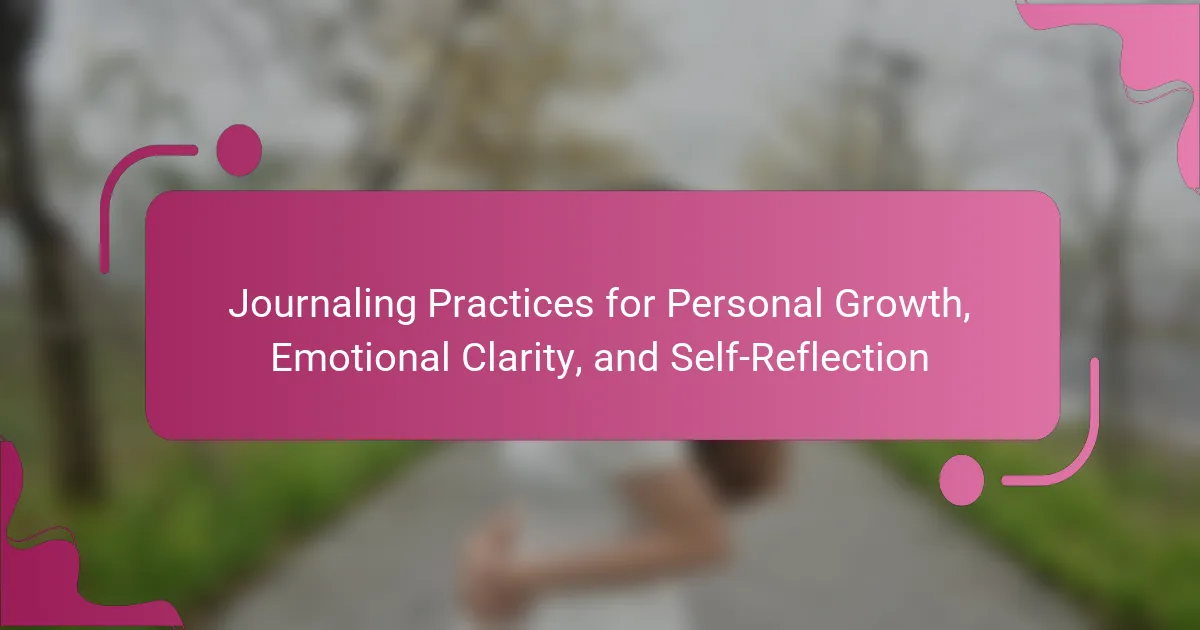Journaling practices significantly enhance personal growth and emotional clarity. This article explores how regular journaling fosters self-reflection, identifies behavioral patterns, and provides techniques for deeper insights. It also addresses common challenges faced by individuals starting their journaling journey and offers strategies for establishing a successful practice.

How do journaling practices enhance personal growth?
Journaling practices significantly enhance personal growth by promoting emotional clarity and self-reflection. Engaging in regular journaling allows individuals to articulate thoughts and feelings, leading to greater self-awareness. This practice also helps in identifying patterns in behavior and emotions, fostering personal development. Studies show that expressive writing can reduce stress and improve mental health, making it a valuable tool for emotional well-being. Additionally, journaling can clarify goals and aspirations, enabling individuals to track progress and celebrate achievements.
What are the psychological benefits of journaling for self-improvement?
Journaling offers significant psychological benefits for self-improvement, including enhanced emotional clarity, increased self-awareness, and stress reduction. Engaging in regular journaling helps individuals process their thoughts and feelings, leading to better emotional regulation. Studies indicate that expressive writing can improve mental health by reducing symptoms of anxiety and depression. Additionally, journaling fosters self-reflection, enabling individuals to track personal growth over time and identify patterns in their behavior. This practice often leads to greater resilience and a more positive outlook on life.
Which journaling techniques are most effective for goal setting?
Effective journaling techniques for goal setting include SMART goals, gratitude journaling, and reflective journaling. These methods enhance clarity, motivation, and accountability.
SMART goals involve specific, measurable, achievable, relevant, and time-bound objectives. This structure provides a clear framework for tracking progress. Gratitude journaling fosters a positive mindset, reinforcing motivation by recognizing achievements. Reflective journaling allows individuals to assess their experiences, identify obstacles, and adapt strategies.
Incorporating these techniques can significantly improve goal-setting outcomes by promoting self-awareness and intentionality.
How can journaling help in tracking progress over time?
Journaling helps track progress by providing a structured way to reflect on experiences and growth over time. Regular entries allow individuals to identify patterns, set goals, and measure achievements. This practice enhances emotional clarity and self-awareness, fostering personal growth. By reviewing past entries, one can gain insights into their journey, recognize improvements, and adjust future actions accordingly.
What role does consistency play in achieving personal growth through journaling?
Consistency is crucial for personal growth through journaling as it fosters discipline and reflection. Regular practice enhances emotional clarity and self-awareness, enabling deeper insights into personal experiences. Establishing a routine can lead to significant improvements in mental well-being and goal achievement. For instance, daily journaling can solidify habits and reinforce positive thinking patterns, making personal growth more attainable.

How does journaling promote emotional clarity?
Journaling enhances emotional clarity by providing a structured space for self-reflection and expression. It allows individuals to process thoughts and feelings, leading to greater self-awareness. Regular journaling helps identify patterns in emotions and behaviors, promoting understanding and resolution of internal conflicts. This practice can reduce anxiety and improve emotional regulation, fostering a healthier mindset.
What are the mechanisms by which journaling facilitates emotional processing?
Journaling facilitates emotional processing by providing a structured outlet for thoughts and feelings. It encourages self-reflection, helping individuals identify and articulate their emotions. This practice can lead to increased emotional clarity and understanding. Writing about experiences allows for cognitive restructuring, which can alleviate stress and promote psychological well-being. Additionally, journaling fosters mindfulness, enabling individuals to stay present and engaged with their emotions.
Which types of journaling are best for managing emotions?
Reflective journaling, gratitude journaling, and expressive writing are effective types for managing emotions. Reflective journaling encourages self-exploration and clarity, while gratitude journaling fosters positivity by focusing on appreciation. Expressive writing allows for emotional release, helping to process feelings and reduce stress. Each practice offers unique benefits that contribute to emotional well-being and personal growth.
How can reflective journaling improve emotional intelligence?
Reflective journaling enhances emotional intelligence by fostering self-awareness and empathy. It encourages individuals to explore their thoughts and feelings, leading to greater emotional clarity. Regular practice can reveal patterns in emotional responses, helping one to understand and manage emotions effectively. Furthermore, it promotes active listening skills and the ability to reflect on interpersonal interactions, which are critical components of emotional intelligence.

What self-reflection techniques can be integrated into journaling practices?
Self-reflection techniques can enhance journaling practices by fostering deeper insights. Techniques include prompts, gratitude lists, and stream-of-consciousness writing. Prompts guide focus, while gratitude lists cultivate positivity. Stream-of-consciousness writing encourages free expression, revealing subconscious thoughts. Each technique supports emotional clarity and personal growth.
How does guided journaling differ from free writing for self-reflection?
Guided journaling provides structured prompts, while free writing encourages unrestricted expression. Guided journaling focuses on specific themes or questions, enhancing clarity and insight. Free writing fosters creativity and spontaneity, allowing deeper emotional exploration. Both practices support self-reflection but serve different purposes in personal growth.
What prompts can enhance the depth of self-reflection in journaling?
Prompts that enhance self-reflection in journaling include open-ended questions and targeted themes. Consider these effective prompts:
1. What are my core values, and how do they guide my decisions?
2. What emotions have I experienced this week, and what triggered them?
3. How have I grown in the past year, and what contributed to that growth?
4. What fears are holding me back, and how can I address them?
5. What lessons have I learned from recent challenges, and how can I apply them?
These prompts encourage deeper exploration of thoughts and feelings, fostering personal growth and emotional clarity.
Which journaling formats are most conducive to deep self-exploration?
Reflective journaling, guided prompts, and free writing formats are most conducive to deep self-exploration. These methods encourage introspection and facilitate emotional clarity. Reflective journaling allows individuals to analyze their thoughts and feelings over time. Guided prompts provide structured questions that can lead to profound insights. Free writing fosters creativity and uncensored expression, enabling deeper self-discovery. Each format uniquely supports personal growth by enhancing self-awareness and emotional processing.

What unique attributes of journaling practices can enhance their effectiveness?
Unique attributes of journaling practices include intentionality, personalization, and consistency, which enhance their effectiveness. Intentional journaling focuses on specific goals, fostering clarity and direction. Personalization allows individuals to tailor their journaling style and content, making it more meaningful. Consistency in practice builds a habit, reinforcing emotional growth and self-reflection over time. These attributes collectively contribute to deeper insights and transformative experiences in personal development.
How do cultural influences shape journaling practices and their outcomes?
Cultural influences significantly shape journaling practices and their outcomes by affecting themes, styles, and purposes. Different cultures prioritize various aspects of self-reflection, such as emotional expression or goal setting. For instance, collectivist cultures may emphasize community and shared experiences in journaling, while individualistic cultures often focus on personal achievements and introspection.
The language used in journaling reflects cultural nuances. Certain cultures promote poetic or metaphorical expressions, enhancing emotional clarity. Additionally, the frequency and formality of journaling vary; some cultures adopt daily routines, while others may journal during specific life events.
Cultural values also dictate the perceived benefits of journaling. In some societies, journaling serves as a therapeutic tool, fostering emotional clarity and personal growth. In contrast, others may view it as a means to document experiences for future generations, emphasizing legacy over personal insight.
Overall, cultural contexts enrich journaling practices, influencing both the process and the outcomes, leading to diverse expressions of self-reflection across the globe.
What rare journaling methods have emerged in contemporary practices?
Rare journaling methods like visual journaling, bullet journaling, and gratitude journaling have gained traction. Visual journaling combines art and writing, enhancing emotional expression. Bullet journaling organizes thoughts efficiently, promoting clarity and productivity. Gratitude journaling focuses on positive aspects, fostering a mindset shift. Each method supports personal growth and self-reflection uniquely.

Which common challenges do individuals face when starting a journaling practice?
Individuals often face several challenges when starting a journaling practice. Common obstacles include a lack of time, uncertainty about what to write, and fear of judgment. Many struggle with consistency, leading to gaps in their journaling habits. Additionally, some may find it difficult to express emotions or confront personal issues on paper. These challenges can hinder personal growth and emotional clarity, which are key benefits of effective journaling.
How can one overcome writer’s block in journaling?
To overcome writer’s block in journaling, establish a routine, set small goals, and use prompts. Consistency in practice fosters creativity. Start with brief entries to build momentum. Experiment with different styles or topics to reignite interest. Engage in reflective activities like meditation to clear mental blocks.
What strategies can help maintain motivation for regular journaling?
To maintain motivation for regular journaling, establish a consistent routine, set specific goals, and create a comfortable writing environment. Incorporate prompts to inspire creativity and reflect on past entries to track progress. Celebrate milestones to reinforce positive habits.

What best practices should be followed for successful journaling?
To achieve successful journaling, establish a routine, set clear intentions, and practice honesty in your entries. Begin by choosing a consistent time and place for journaling to build a habit. Define your purpose, whether it’s for emotional clarity or self-reflection, to guide your writing. Write freely without self-censorship, allowing your thoughts to flow naturally. Review your entries periodically to track your growth and insights. Lastly, experiment with different formats, such as lists or prompts, to keep the practice engaging and dynamic.
How can one create a conducive environment for journaling?
To create a conducive environment for journaling, prioritize quiet, comfortable spaces. Ensure good lighting and minimal distractions. Incorporate personal touches, like favorite quotes or calming visuals, to enhance inspiration. Establish a routine by selecting specific times for journaling to cultivate consistency.
What are the most effective journaling tools and resources available?
Effective journaling tools and resources enhance personal growth, emotional clarity, and self-reflection. Popular options include digital apps, guided journals, and online communities.
Digital apps like Day One and Journey offer prompts, organization features, and multimedia integration. Guided journals, such as The Five Minute Journal, provide structured formats to encourage daily reflection. Online communities, including Reddit and journaling forums, offer support and inspiration from fellow journalers.
These resources facilitate consistent journaling practices, promoting deeper self-understanding and emotional well-being.
What common mistakes should be avoided in journaling for personal growth?
To enhance personal growth through journaling, avoid common mistakes such as inconsistency, negativity, lack of focus, and comparison to others. Inconsistency leads to missed opportunities for reflection. Negativity can hinder emotional clarity; instead, aim for balanced perspectives. A lack of focus on specific goals or themes can dilute insights. Lastly, comparing your journey to others can undermine personal progress.
